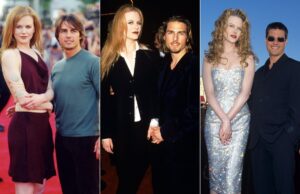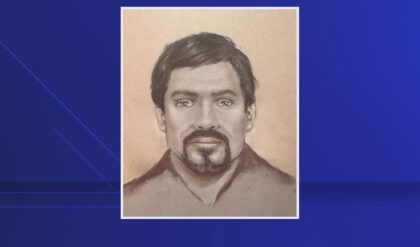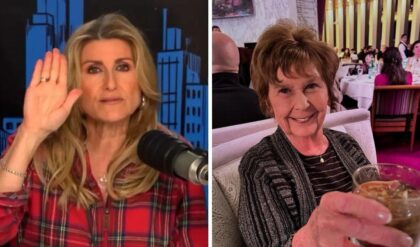“Eyes Wide Shut” was Stanley Kubrick’s final film. He died four months before its release. It took its stars — Tom Cruise and Nicole Kidman, Hollywood’s most famous couple — off the market for nearly two years, as what was supposed to be a six-month shoot stretched on indefinitely, to the point where Kidman seriously began to wonder: Is this ever going to end?
Not that she was in any hurry to leave.
“I would have stayed a third year,” Kidman tells me. “Does that mean I’m crazy?”
The protracted buildup led to wild speculation and curiosity about the movie, which had been teased as a “story of sexual jealousy and obsession.” When it was finally released on July 16, 1999, the response was muted, tinged with disappointment. But its reputation and its mysteries have deepened over the years. Christopher Nolan calls it “the ‘2001’ of relationship movies.” He is not entirely wrong.
The 1999 Project
All year we’ll be marking the 25th anniversary of pop culture milestones that remade the world as we knew it then and created the world we live in now. Welcome to The 1999 Project, from the Los Angeles Times.
Kidman and I have talked about the film many times over the years. With “Eyes Wide Shut” marking its 25th anniversary, it felt like a good occasion to deepen the discussion.

You told me once that Kubrick jettisoned a scene in “Eyes Wide Shut” that you had spent six weeks filming. What scene?
Maybe that was an exaggeration. [Laughs.] It was the scene with Tom and I where I start by smoking the spliff in bed and where I laugh and deliver the long monologue. That took many weeks. A lot of that was rehearsing in the bedroom and then him not liking what we’d done. So we ended up reworking it, constructing it as we went along. There was no need to rush. Stanley would never go over budget. What he bought was time.
How did that scene evolve?
Just a lot of talking. When Tom and I first started with Stanley, it was at his home, and we didn’t even go over to the sets at Pinewood [Studios]. Six, eight weeks passed, and we’re wondering, “Are we ever going to start?” And we just wouldn’t start. We were getting comfortable with each other, comfortable enough to throw out ideas. For that scene, we improvised the beginning of it through the rehearsals.
Did you feel like he was mining your own marriage to inform the relationship between Bill and Alice?
I suppose he was mining it. There were ideas he was interested in. He’d ask a lot of questions. But he had a strong sense of the story he was telling. I do remember him saying, “Triangles are hard. You have to tread carefully when it’s a triangle.” Because one person could feel ganged up on. But he was aware of that and knew how to manage us.
Did you ever feel ganged up on?
No. But there’s something about being a woman in that equation, too. And Stanley liked women. He had a different relationship with Tom. They worked more closely together on his character.
So you’re having these conversations, getting to know each other, and he’s shaping the script. What part of yourself did you bring to Alice?
My boldness. I’m quite up-front and Alice becomes quite up-front, particularly when she was stoned … although that wasn’t me when I was stoned. I was just naturally like that. Up-front.
How much experience in being stoned did you bring to the role?
Oh, I smoked when I was younger. But it definitely wasn’t of interest then.
I remember reading somewhere that Kubrick told you something like, “Remember, Nicole. The key to the scene is that Alice is stoned.”
And I probably would have said, “Of course, Stanley. Yeah. Got it.”
The great thing about him is that he told us, “Don’t put me on a pedestal.” That’s the No. 1 rule. Because when we came to his house, we were like, “Oh, my God. The great Stanley Kubrick.” And that kind of thinking hinders the creative process. He didn’t want sycophants. He told us to throw ideas out. And everyone has to wait at least 10 seconds before they say no to an idea. I heard that, and I’m in my 20s, and I’m like, “OK. It’s on.” It was experimental, like making student films in Australia.
That boldness comes through when Alice is dancing with the Hungarian guy who’s trying to seduce her.
“I’m maaaaarried.” I love when I’m shaking my finger at him. All that wasn’t scripted. It came out of rehearsing.
She draws out a lot of words while she’s dancing with him.
I’ve definitely been drunk on champagne, so I knew how to do that. [Laughs.] And I’m sure I’ve said “I’m married” to different people at different times, so that’s good too.
Meanwhile, Bill is hitting on the two young models, which Alice sees. Before that bedroom scene, she grabs the joint from a Band-Aid box and she looks at herself in the vanity mirror. There’s definitely a sense that she’s about to start something. She’s ready for a confrontation.
Mmm-hmmm. To dig around. But these were conversations we never had with Stanley, what you and I are doing now.
He didn’t like burrowing into the scenes?
“Why” was the most irritating question to him. It is to a lot of directors. I remember saying it to Philip Roth [author of “The Human Stain,” adapted into a 2003 film starring Kidman] and him going, “Don’t ever ask me that.” Then he gave me a signed copy of the book that he had inscribed, “Why not?”
So Kubrick would just get what he wanted by wearing you down?
I don’t know how he would get it. But in that scene, I suppose that was why he cast me. That mischief, that provocative nature, he found that out and it got more imbued into Alice. The scene where I drop the dress … that was me. That wasn’t written. That was my dress from my closet. “This is how I take off the dress, Stanley.” Because I had a lot of clothes, we weren’t paying to buy clothes. And Stanley had come over and I was showing him all these beautiful dresses. That’s how that happened.
Are you aware of how that monologue [Alice telling Bill, “If you men only knew” and then revealing her sexual fantasy about the naval officer] has taken on a life of its own? Frank Ocean used the whole thing in “Love Crimes.”
Get out! Are you kidding me? I love that. Thank you, Frank Ocean!
When I watched the movie again recently, I was taking notes and wrote, “Bill’s a s—.” I think Alice had been holding a lot and this scene was her —
Poking him. Or maybe it opens him up.
Well, that revelation devastates him.
But human beings are devastating. And you don’t ever have real access to somebody’s thoughts. You may know someone. And you may not. It’s not the things we may want to hear, but it’s deeply honest.
James Joyce has that short story that I had already read before “Eyes Wide Shut” where something is found out within 15 seconds that literally destroys the marriage there on the spot, even though it was a very good marriage. Because it was based on what they thought each person was. And then it’s like, “You were never the person I thought you were.”
Stanley always said animals are far more honest than humans. I remember we were watching a wildlife show on lions and the lion went in and ferociously attacked. He was upset by that, but also said, “Well, at least animals are more readable. You know what their motives are.”
Did you agree with him?
No! I’d tell him, “That’s not true!” [Laughs.] And he‘d say, “Nicole. Nicole.” But I like to have a more hopeful sense of humans, which I’d always try to argue in my youthful enthusiasm.
You have the last word in the last Stanley Kubrick movie. [After Alice tells Bill there’s something they “need to do as soon as possible,” he asks, “What’s that?” She answers with one word.]
And it’s a pretty good word. [Laughs.] And that came out of the rehearsal process too. When you watch it, it’s great because it’s a base, primal thing to do. But I’ve never thought of that. I have the last line in the final Stanley Kubrick movie. No one has ever said that to me. That’s a career in itself. I’ll take it.
What do people say to you when they talk about the movie?
They want to know what it was like to spend that much time making it, which I understand. It was two years of our lives! [Laughs.] I remember Sydney Pollack when he arrived, telling us, “I’m only going to be here for about three days. And it seems like we got the scene today.” And Tom and I just looked at each other, going, “Mmm-hmmm. Sure, Sydney.”
You didn’t tell him? You figured he’d discover the truth soon enough?
No. It was like [brightly], “Welcome!” By the end, we’re learning how to make pasta because he’s a great cook, Sydney. Stanley would come to our trailer, we’d eat. In the little kitchen in our trailer, Sydney would make this unbelievable artichoke pasta with [Parmigiano-]Reggiano and this incredible olive oil and roast chicken.
We had a home 10 minutes away, but we lived in that trailer. Tom and I shared it because Stanley would say, “You’re not each getting a trailer. We can’t afford it.” Tom had a smaller area because he was running stuff. And he’d play video games. That was when [“Minesweeper”] was big. So there was a lot of that.
Are you aware that watching “Eyes Wide Shut” has become a Christmas movie ritual for some?
Sheesh. That’s an odd Christmas movie! [Laughs.] Well, there’s so many layers to all of his films, which is why we keep coming back to them.
Do you think the finished film was his final cut?
Oh, yeah. He had been editing it for 18 months. It wasn’t like he didn’t have enough time. He was very happy with it. For him to show it to us, that is huge, if you know Stanley. And the Warners people were there. He wasn’t going back to the drawing board.
Have you ever seen it again since that initial screening in March in New York, shortly before he died?
I’ve seen bits of it. But I’ve never watched it all the way through. [Pause.] Maybe I’ll watch it at Christmas. [Laughs.]
It’s not a film you’re going to sit down and watch with your daughters, is it?
Definitely not. At the AFI [Life Achievement Award] tribute, they saw the scene where I get stoned. They showed that and I was like, “Ooooh. Golly. OK.” I sat next to my daughter, Sunday, watching that.
Did she say anything to you?
She said, “Mom, that was good.” And then they showed that scene in “Birth,” the one you and I talked about, and she said, “That was really good.” And I watched that scene and thought, “Wow. That was really good.” And I never do that.
You probably hadn’t seen that in ages either.
People watching their own films feels slightly odd to me. I’m OK celebrating directors because it’s their work. But my own little part of it, it’s like [groans]. But if you’re a director, it’s lovely to hear that you’re proud of it. So I’m very, very proud of it. I say that to you, Stanley up there, if you’re listening to me. He knows that anyway.


